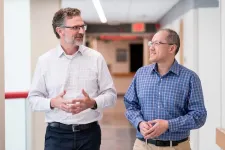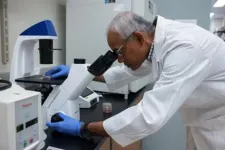(Press-News.org) A new study from scientists at Cincinnati Children’s suggests there may be a way to further protect transplanted hearts from rejection by preparing the donor organ and the recipient with an anti-inflammatory antibody treatment before surgery occurs.
The findings, published online in PNAS, focus on blocking an innate immune response that normally occurs in response to microbial infections. The same response has been shown to drive dangerous inflammation in transplanted hearts.
In the new study – in mice -- transplanted hearts functioned for longer periods when the organ recipients also received the novel antibody treatment. Now the first of a complex series of steps has begun to determine whether a similar approach can be safely performed for human heart transplants.
“The anti-rejection regimens currently in use are broad immunosuppressive agents that make the patients susceptible to infections. By using specific antibodies, we think we can just block the inflammation that leads to rejection but leave anti-microbial immunity intact,” says corresponding author Chandrashekhar Pasare, DVM, PhD, director of the Division of Immunobiology at Cincinnati Children’s.
Making memory T cells a bit more forgetful
The research team, which included first author Irene Saha, PhD, a research fellow in the Pasare Lab, and several colleagues at Cincinnati Children’s, zeroed in on how dendritic cells from the donor organ trigger an inflammatory response in the recipient’s body.
Specifically, the team found that memory CD4 T cells in the recipient activated donor dendritic cells through signals delivered by the proteins CD40L and TNFα. When this signaling pathway was blocked with gene editing techniques, the results included dampened inflammation and prolonged survival of transplanted hearts.
In the study, untreated mice rejected the donated heart within a week. But in mice that were gene edited to lack receptors for CD40L and TNFα, strong heart function persisted through day 66, when the experiment was terminated.
“We have been working on this for almost a decade,” Pasare says. “The major reason we figured out this pathway is because we focused on understanding how memory T cells in the recipient with potential reactivity to donor specific antigens induce innate inflammation. The rest of the field has focused on other concepts such as ischemia reperfusion injury, ligands from dead cells, and innate immune receptors, none of which seem to really lead to transplant rejection.”
Pasare continues: “The key to preventing organ rejection is to take away the ability of recipient’s memory T cells to initiate inflammation when they recognize donor antigens in dendritic cells. While T cell memory is critical to fight infections, the innate inflammation initiated by memory T cells is detrimental to the survival of transplanted organs.”
Next steps
The co-authors believe the process they used to protect hearts from rejection may also apply to other forms of organ transplantation.
However, the gene editing performed with the mice would not be considered safe for humans. So now the research team is evaluating other ways to disrupt the inflammatory response.
“Using blocking antibodies against CD40 could be a good approach. Another option would be to create biologics or compounds that specifically target the TNF receptor superfamily in humans,” Pasare says. “I think this is a very exciting area for future drug development.”
About the study
Cincinnati Children’s co-authors also included Amanpreet Singh Chawla, PhD, a former postdoctoral fellow in the Pasare lab; Ana Paula Oliveira, PhD, a postdoctoral fellow in the Hagan Lab; Eileen Elfers, BS, a research assistant in the Katz lab; Kathrynne Warrick, BS, an MSTP student in the Pasare Lab; Hannah Meibers, PhD, a former graduate student in the Pasare Lab; Thomas Hagan, PhD, Division of Infectious Diseases; and Jonathan Katz, PhD, Division of Immunobiology.
Funding sources for this study included grants from the National Institutes of Health (R01 AI123176, R01 AI155426, and U54 DK126108). The work also was supported by the Veterinary Services Facility, Research Flow Cytometry Core, and the Bioinformatics Collaborative Services Core at Cincinnati Children’s.
END
Pre-surgical antibody treatment might prevent heart transplant rejection
In mice, an inflammation-blocking approach boosted organ survival from about a week to more than two months
2024-08-12
ELSE PRESS RELEASES FROM THIS DATE:
Scientists identify genes linked to relapse in the most common form of childhood leukemia
2024-08-12
Scientists from St. Jude Children’s Research Hospital, Seattle Children’s and the Children’s Oncology Group (COG) have identified novel genetic variations that influence relapse risk in children with standard risk B-cell acute lymphoblastic leukemia (SR B-ALL), the most common childhood cancer. The identification of genomic predictors of relapse in SR B-ALL provides a basis for improved diagnosis, precise tailoring of treatment intensity and potentially the development of novel treatment approaches. The study was published today in the Journal of ...
Local solvation is decisive for fluorescence of biosensors
2024-08-12
At Ruhr University, the groups of Professor Martina Havenith and Professor Sebastian Kruss collaborated for the study, which took place as part of the Cluster of Excellence “Ruhr Explores Solvation”, RESOLV for short. The PhD students Sanjana Nalige and Phillip Galonska made significant contributions.
Carbon nanotubes as biosensors
Single-walled carbon nanotubes are powerful building blocks for biosensors, as previous studies revealed. Their surface can be chemically tailored with biopolymers or DNA fragments to interact specifically with a certain target molecule. When such molecules bind, the nanotubes change their emission ...
Parents who use humor have better relationships with their children, study finds
2024-08-12
UNIVERSITY PARK, Pa. — They say that laughter is the best medicine, but it could be a good parenting tool too, according to a new study led by researchers from Penn State.
In a pilot study, the research team found that most people viewed humor as an effective parenting tool and that a parent or caregiver’s use of humor affected the quality of their relationship with their children. Among those whose parents used humor, the majority viewed their relationship with their parents and the way they were ...
HHMI invests $500 million in AI-driven life sciences research
2024-08-12
The Howard Hughes Medical Institute today announced AI@HHMI, a $500 million investment over the next 10 years to support artificial intelligence-driven projects in the life sciences. As the largest private biomedical research organization in the United States, HHMI aims to explore the full promise of AI to accelerate scientific discovery at its Janelia Research Campus in Ashburn, Virginia, and at the more than 300 HHMI-affiliated labs.
“By bringing human curiosity and artificial intelligence closer together at every phase of experimentation ...
Locked out of banking: Incarceration is associated with decreased bank account ownership
2024-08-12
People who have served time in jail or prison are less likely to have bank accounts after they are released than they were before serving time, which may hinder their long-term financial security, according to new research.
“Locked out of banking: The limits of financial inclusion for formerly incarcerated individuals” was authored by Brielle Bryan, an assistant professor of sociology at Rice University and J. Michael Collins, a professor of public affairs and human ecology and the Fetzer Family Chair in Consumer and Personal Finance at the University of Wisconsin-Madison. It ...
Research spotlight: Generative AI “drift” and “nondeterminism” inconsistences are important considerations in healthcare applications
2024-08-12
Samuel (Sandy) Aronson, ALM, MA, executive director of IT and AI Solutions for Mass General Brigham Personalized Medicine and senior director of IT and AI Solutions for the Accelerator for Clinical Transformation, is the corresponding author of a paper published in NEJM AI that looked at whether generative AI could hold promise for improving scientific literature review of variants in clinical genetic testing. Their findings could have a wide impact beyond this use case.
How would you summarize your study for a lay audience?
We tested whether ...
Comprehensive atlas of normal breast cells offers new tool for understanding breast cancer origin
2024-08-12
INDIANAPOLIS — Researchers at the Indiana University Melvin and Bren Simon Comprehensive Cancer Center have completed the most extensive mapping of healthy breast cells to date. These findings offer an important tool for researchers at IU and beyond to understand how breast cancer develops and the differences in breast tissue among genetic ancestries.
Published this month in Nature Medicine, researchers developed a comprehensive atlas of breast tissue cells – including details ...
Huang studying electric distribution system protection – Modeling and testing with real-time digital simulator
2024-08-12
Liling Huang, Associate Professor, Department of Electrical and Computer Engineering Dominion Energy Faculty Fellow, received funding for: “Electric Distribution System Protection - Modeling and Testing with Real-Time Digital Simulator.”
Huang will address the complexities of the electric distribution system introduced by Distributed Energy Resources (DERs) through Real-Time Digital Simulator (RTDS) modeling and Hardware-in-the Loop (HIL) simulation to enhance protection system ...
Singh receives funding for AI innovation for economic competitiveness
2024-08-12
JP Singh, Distinguished University Professor, Schar School of Policy and Government, received funding for: “George Mason University Center for AI Innovation for Economic Competitiveness.” He is collaborating on the project with Co-Principal Investigator Amarda Shehu, Associate Vice President of Research, Institute for Digital Innovation, Professor, Computer Science, College of Engineering and Computing (CEC); Jesse Kirkpatrick, Research Associate Professor, Philosophy, College of Humanities and Social Sciences; Acting Director, Institute for Philosophy and Public Policy, Philosophy and Religious Studies; Terry Clower, Northern Virginia Chair in Local ...
Bacteria in lakes fight climate change
2024-08-12
Methane is a potent greenhouse gas frequently produced in the sea and in fresh water. Lakes in particular release large quantities of this climate-killer. Fortunately, however, there are microorganisms that counteract this: They are able to utilize methane to grow and generate energy, thus preventing it from being released into the atmosphere. These microorganisms, known as methanotrophs, are therefore regarded as an important "biological methane filter".
Methanotrophs comprise various groups of microorganisms, and many questions about their way of life have yet to be answered. A study by researchers from the Max Planck Institute for ...
LAST 30 PRESS RELEASES:
Fecal transplants from older mice significantly improve ovarian function and fertility in younger mice
Delight for diastereomer production: A novel strategy for organic chemistry
Permafrost is key to carbon storage. That makes northern wildfires even more dangerous
Hairdressers could be a secret weapon in tackling climate change, new research finds
Genetic risk for mental illness is far less disorder-specific than clinicians have assumed, massive Swedish study reveals
A therapeutic target that would curb the spread of coronaviruses has been identified
Modern twist on wildfire management methods found also to have a bonus feature that protects water supplies
AI enables defect-aware prediction of metal 3D-printed part quality
Miniscule fossil discovery reveals fresh clues into the evolution of the earliest-known relative of all primates
World Water Day 2026: Applied Microbiology International to hold Gender Equality and Water webinar
The unprecedented transformation in energy: The Third Energy Revolution toward carbon neutrality
Building on the far side: AI analysis suggests sturdier foundation for future lunar bases
Far-field superresolution imaging via k-space superoscillation
10 Years, 70% shift: Wastewater upgrades quietly transform river microbiomes
Why does chronic back pain make everyday sounds feel harsher? Brain imaging study points to a treatable cause
Video messaging effectiveness depends on quality of streaming experience, research shows
Introducing the “bloom” cycle, or why plants are not stupid
The Lancet Oncology: Breast cancer remains the most common cancer among women worldwide, with annual cases expected to reach over 3.5 million by 2050
Improve education and transitional support for autistic people to prevent death by suicide, say experts
GLP-1 drugs like Ozempic could cut risk of major heart complications after heart attack, study finds
Study finds Earth may have twice as many vertebrate species as previously thought
NYU Langone orthopedic surgeons present latest clinical findings and research at AAOS 2026
New journal highlights how artificial intelligence can help solve global environmental crises
Study identifies three diverging global AI pathways shaping the future of technology and governance
Machine learning advances non targeted detection of environmental pollutants
ACP advises all adults 75 or older get a protein subunit RSV vaccine
New study finds earliest evidence of big land predators hunting plant-eaters
Newer groundwater associated with higher risk of Parkinson’s disease
New study identifies growth hormone receptor as possible target to improve lung cancer treatment
Routine helps children adjust to school, but harsh parenting may undo benefits
[Press-News.org] Pre-surgical antibody treatment might prevent heart transplant rejectionIn mice, an inflammation-blocking approach boosted organ survival from about a week to more than two months




